Marketing has developed more in the last five years than it did in the one prior fifty. Customers no longer pursue a fresh linear path before making a purchasing decision. Instead, they click an Instagram ad, view a YouTube video, read a blog post, search Google, and open an email before deciding to convert. As a marketer, identifying which of those connections were genuinely important can feel like a puzzle with missing pieces.
This is where marketing attribution comes into play. And by 2025, AI-powered attribution solutions will no longer just be “nice to have”; they will be essential for professional marketers looking to make sense of complex customer journeys.
AI-powered attribution systems do not merely give credit for the last click or the first touch. They examine massive databases, identify patterns that would be impossible to detect manually, and anticipate what factors influence conversions. If you’ve ever wondered: “Am I overspending on Facebook? Should I double down on email? Is Google Ads carrying all the weight, or is it just the last stop before checkout?” then you need the clarity only these tools can provide.
In this article, we will look at the best AI-powered marketing attribution tools. Each one offers something unique. Whether you are managing huge enterprise funnels spanning many channels or operating lean e-commerce campaigns, each one has something special to offer.
1. Funnel
Imagine endeavoring to review hundreds of campaigns across Facebook, Google Ads, TikTok, and LinkedIn without twisting your hair out. That is where Funnel excels.
Funnel is more than just a marketing attribution tool. It is a comprehensive data collection and integration platform that gathers information from over 500 sources. The platform converts and harmonizes it before delivering it to your choice BI dashboard, such as Looker Studio, Power BI, or Tableau.
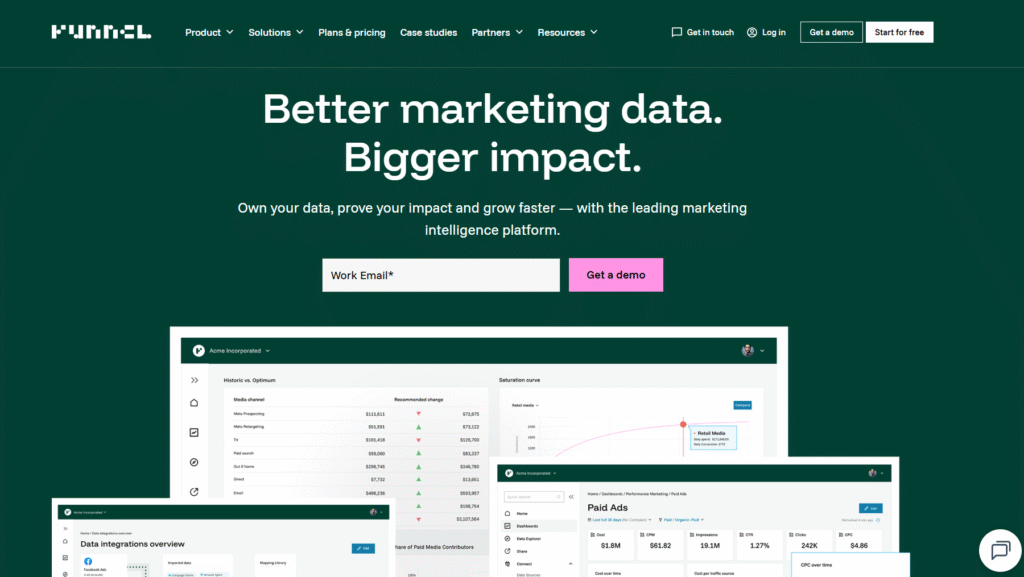
Its AI layer cleans, organizes, and unifies complicated campaign metrics, making attribution models more accurate and reliable. Instead of wasting hours reconciling Facebook link clicks with Google Analytics sessions, marketers can obtain a single view of performance.
Who benefits the most? Funnel is popular among agencies and enterprise marketers who need to manage complex client configurations. The AI-powered attribution ensures that you understand exactly how different ad platforms contribute to customer journeys without having to spend weeks on manual reporting.
Best for: Companies juggling multiple channels that want clean, centralized attribution data.
2. Google Analytics 4 (GA4)
When Google retired Universal Analytics, marketers groaned. But Google Analytics 4 (GA4), though initially unpopular, has matured by 2025 into one of the most reliable AI-enhanced attribution tools.
GA4 uses machine learning to fill in the gaps caused by cookie restrictions and missing third-party data. With user privacy laws getting stricter by the year, this AI-driven inference becomes invaluable. Instead of losing sight of customers when cookies vanish, GA4 helps rebuild journeys with modeled data.
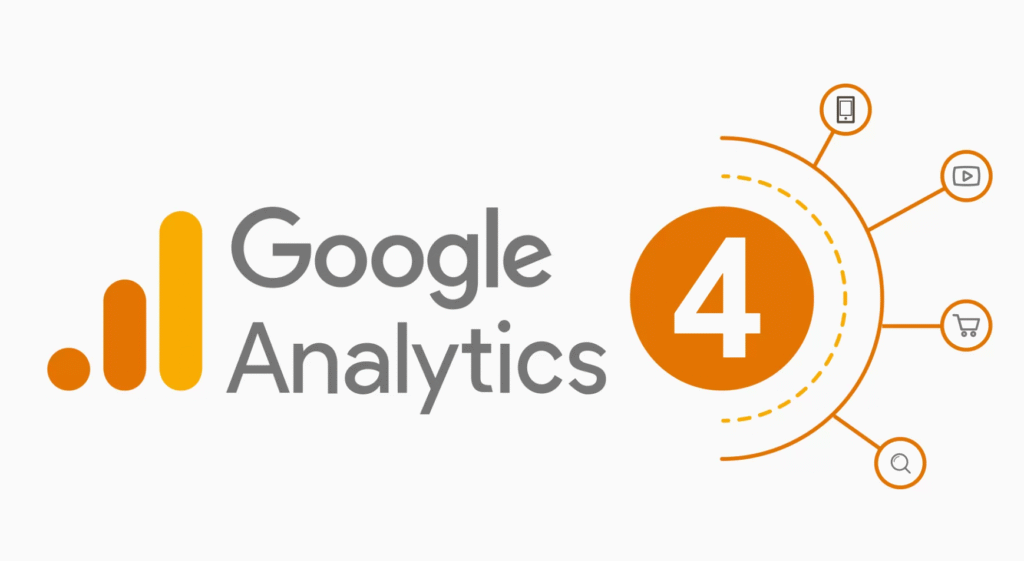
Its Data-Driven Attribution (DDA) model assigns fractional credit to each touchpoint based on observed conversion paths. Unlike “last-click” or “first-click,” DDA considers the full picture. Was that early YouTube ad influencing the eventual purchase? GA4 knows.
For teams that want attribution insights without adding an extra tool to their stack, GA4 is essential. It also integrates tightly with Google Ads, making optimization immediate.
Best for: Small-to-medium businesses (SMBs) and startups who want a no-cost, AI-powered attribution solution.
3. Adinton
Adinton is built on one bold promise: stop wasting ad spend. This AI-powered marketing attribution tool doesn’t just report on marketing effectiveness. It actively reshapes campaigns in real time.
Its AI runs thousands of simulations to identify which ad channels are overspending and where incremental ROAS (Return on Ad Spend) hides. Instead of relying on rule-based models, Adinton predicts behaviors based on customers’ digital footprints.
For example, it might tell you that your Google Search ads bring in quick wins, but your Facebook video campaign, although rarely the last click, influences higher-value customers. This kind of insight prevents marketers from cutting “inefficient” channels that are quietly crucial to the funnel.
What sets Adinton apart is its predictive budgeting feature: its AI recommends how to reallocate budgets automatically. That means you don’t just get insights, you get strategic moves.
Best for: Marketers who want proactive optimization and AI-driven budget recommendations.
4. Wicked Reports
If you’re in e-commerce, subscription boxes, or info-products, you’ve probably heard of Wicked Reports.
The platform is designed for DTC brands that need more than shallow attribution. Wicked Reports connects directly with e-commerce platforms, ad networks, and email providers to build a complete picture of Customer Lifetime Value (CLV).
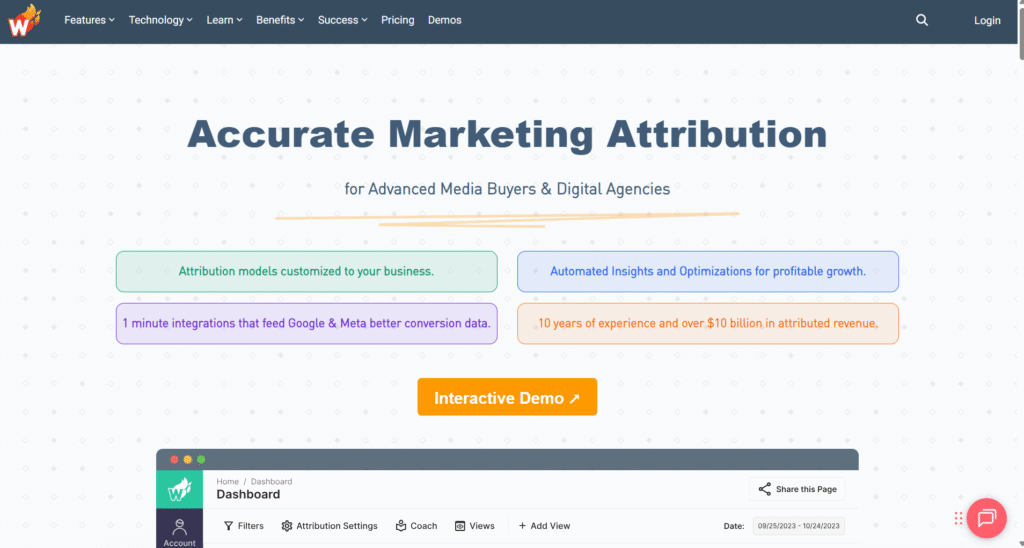
Why does this matter? Because not all conversions are equal. An AI-powered attribution tool that only highlights “fast buyers” could mislead you. Wicked Reports, however, reveals which campaigns generate customers who are still spending months later.
Its strength lies in long-term cohort tracking. You can see whether that influencer’s Instagram campaign from six months ago is still generating high-value customers today.
Best for: E-commerce and subscription-based businesses focusing on customer lifetime value (LTV).
5. Hyros
Few tools have sparked as much buzz in the performance marketing world as Hyros. Used heavily by high-ticket coaches, SaaS, and direct-response marketers, Hyros focuses on laser-accurate, AI-driven attribution.
Unlike GA4, which uses sampled data, Hyros emphasizes precise user tracking combined with AI modeling. Its tracking includes phone calls, sales funnels, emails, and ads, giving a multi-touch view that most other tools miss.
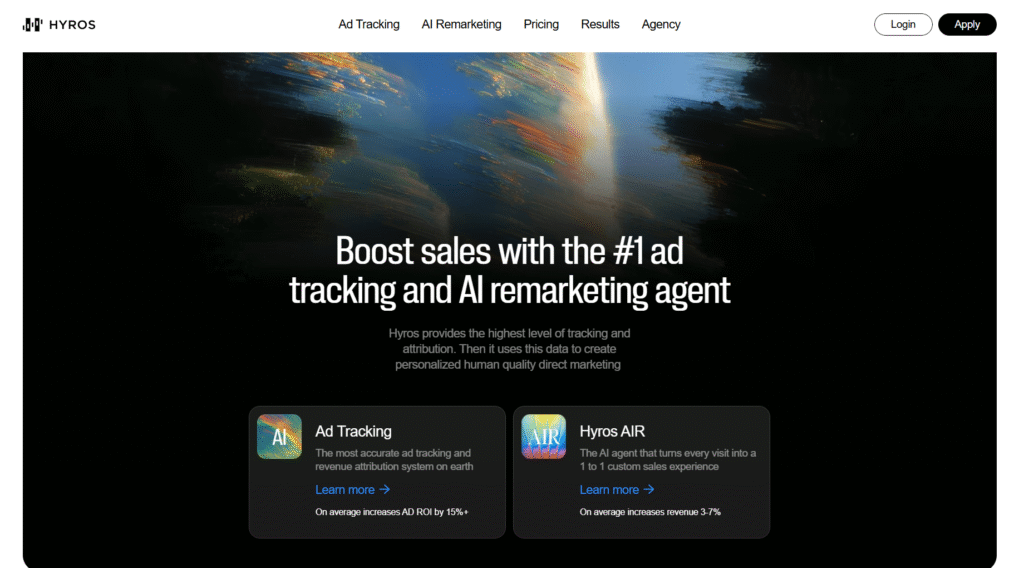
The standout feature is its AI-powered call tracking attribution. For industries like real estate or high-ticket consulting, calls often represent revenue, not clicks. Hyros ensures those touchpoints don’t get lost.
Another strength is offline conversion syncing. For example, your Facebook Ads manager knows which leads actually converted at the end of a long sales cycle, thanks to data pushed in by Hyros.
Best for: High-ticket B2B or B2C marketers, agencies, and coaches.
6. Corvidae
Attribution has always had a problem: cookie drop-offs. Corvidae tackles this through its AI-based identity resolution engine.
Instead of relying solely on cookies, Corvidae applies AI to stitch together behavior across devices, browsers, and even partial datasets. For example, if a user starts on Safari with ad blocking and finishes on Chrome, Corvidae can connect the dots.
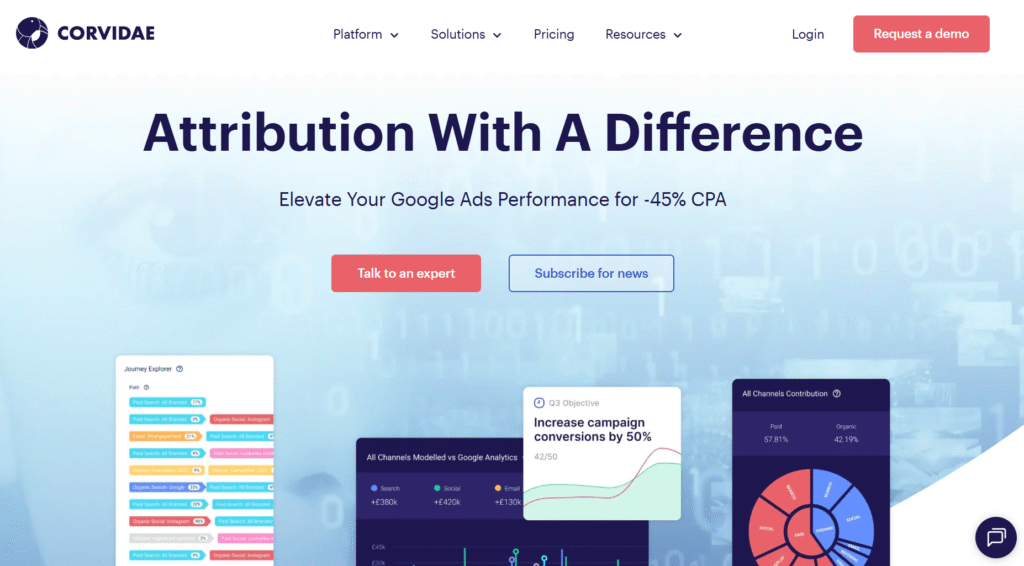
Its core promise is maximizing accuracy in a world where “known data” is shrinking. Businesses that have struggled with broken user journeys find Corvidae invaluable.
This makes it a great choice for regulated industries or regions with strict cookie laws. The AI layer ensures attribution doesn’t collapse just because tracking pixels got blocked.
Best for: Privacy-sensitive industries and businesses hit hardest by cookie restrictions.
7. Windsor.ai
When it comes to transparency and flexibility, Windsor.ai earns its spot.
It’s a cloud-based platform that combines AI, customizable attribution models, and API first data integrations. Marketers can test multiple attribution models in real time, whether data-driven, algorithmic, or U-shaped models.
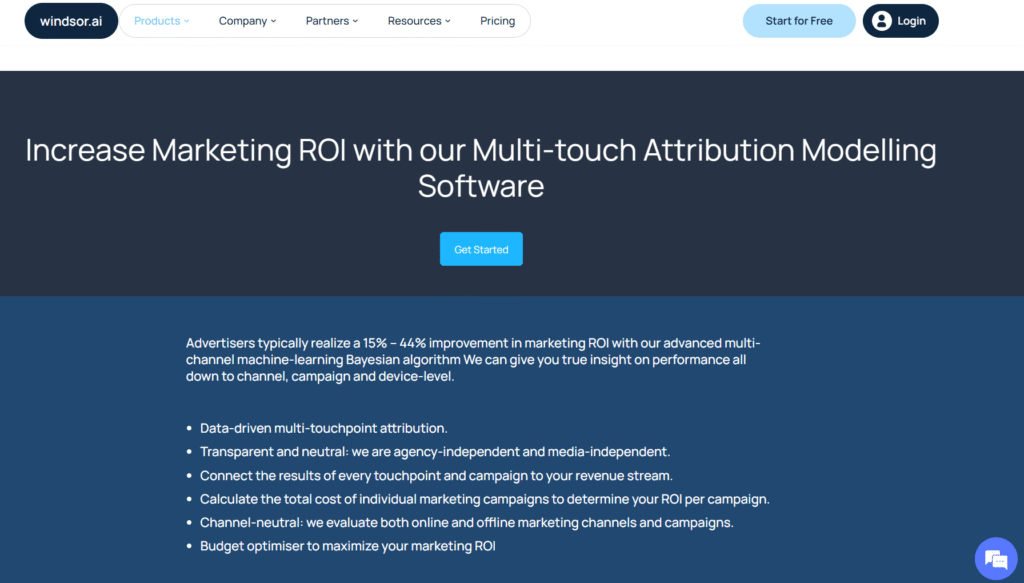
A unique capability: Windsor.ai allows “what-if” scenario planning. If you moved budget 20% from Google Ads to TikTok, what happens to conversions? Its AI predicts outcomes before you actually spend.
For data-driven teams who dislike the “black-box” nature of some AI tools, Windsor delivers transparency into how attribution credit is assigned.
Best for: Data-savvy marketers who want full control over attribution models.
8. HubSpot Marketing Hub
HubSpot Marketing Hub has AI-powered attribution reporting that effortlessly connects with its CRM ecosystem.
Instead of relying on external data platforms, HubSpot integrates CRM, content, and campaigns into a unified ecosystem. Its attribution reports take into consideration blog posts, social media activity, ad clicks, and even sales transactions.
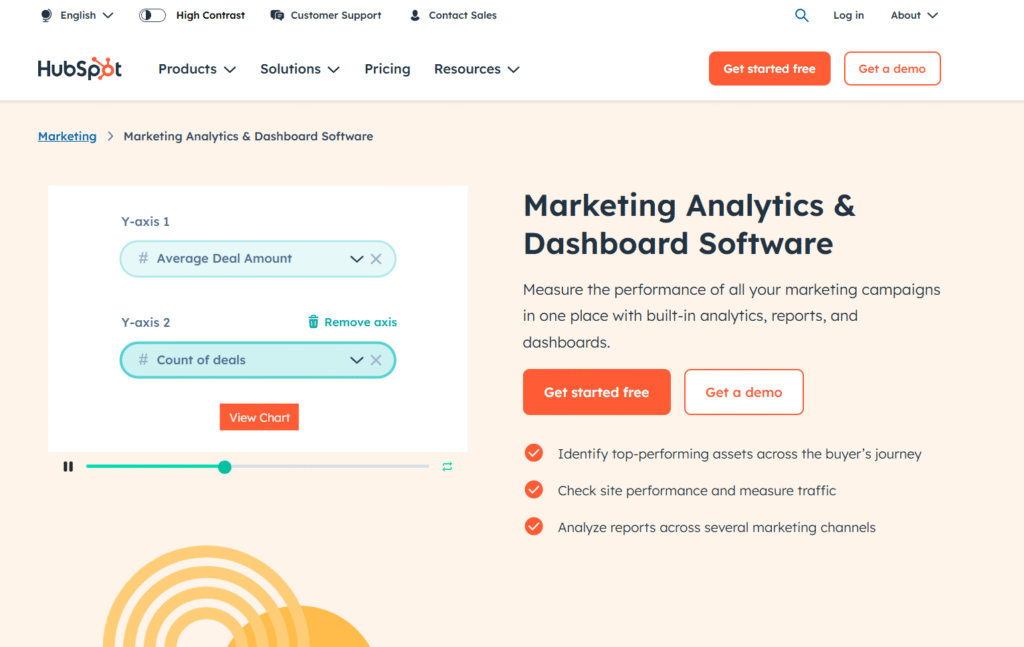
SMBs love it because there’s no complex data integration work required. Larger teams value it for keeping attribution tied directly to pipeline metrics rather than siloed campaign reporting.
Best for: HubSpot ecosystem users and businesses seeking integrated attribution within CRM.
9. Ruler Analytics
Ruler Analytics shines with closed-loop attribution. It captures every touchpoint calls, chats, form fills, websites, ads, and maps, and that data directly into CRM and marketing platforms.
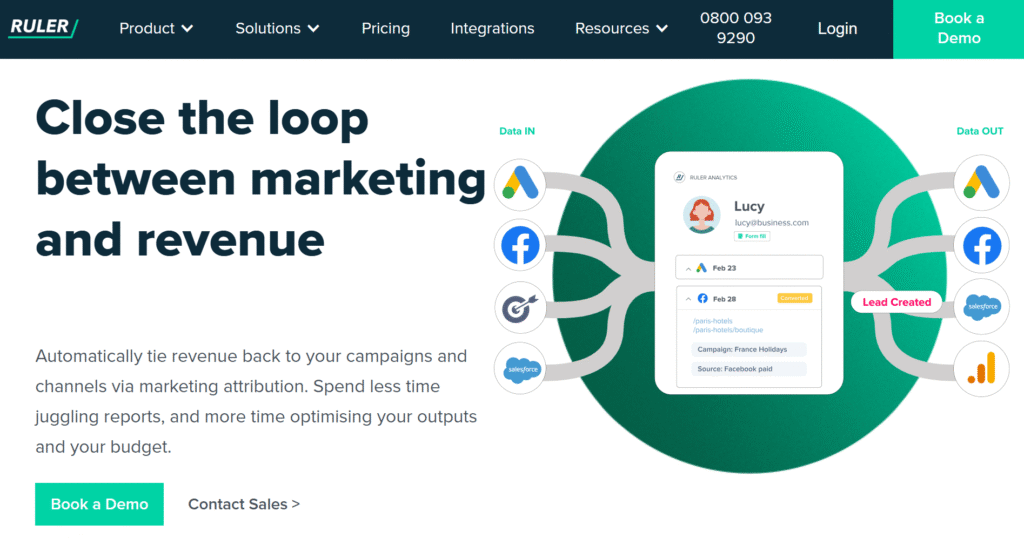
This tight integration is powered by its AI engine, which attributes revenue back to campaigns with remarkable accuracy. Instead of tracking just leads, Ruler ensures marketing sees which campaigns actually close deals with revenue.
Industries like financial services, healthcare, and B2B services find it especially powerful.
Best for: B2B businesses that need revenue-focused attribution, not just lead metrics.
10. SegmentStream
If cookies are dead, how do we track multi-touch attribution? SegmentStream solves this with AI-driven conversion modeling.
It uses machine learning to evaluate every session signal. Instead of waiting for a purchase, SegmentStream predicts conversion probability based on behaviors, time on site, interactions, traffic source, etc.
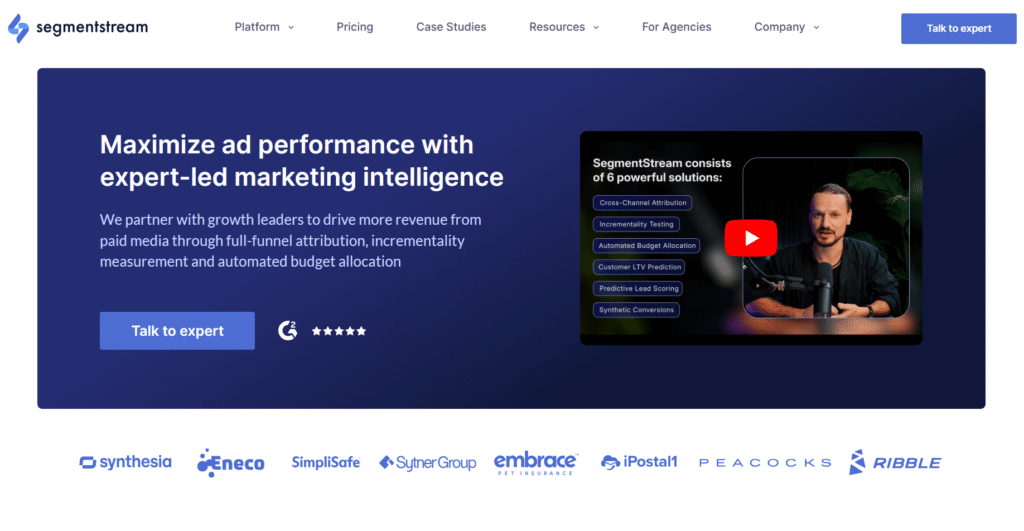
This has made it popular for advertisers struggling with incomplete datasets. Instead of dropping users into “unknown” buckets, AI fills the gaps in attribution.
Best for: Businesses that want AI-projected attribution without relying exclusively on cookies.
11. Triple Whale
Few tools have taken Shopify stores by storm like Triple Whale.
This AI-powered tool centralizes all DTC analytics: ads, emails, influencers, organic, and beyond. For smaller DTC marketers, attribution used to feel impossible without an in-house analyst. Triple Whale changed that with its user-friendly interface and plug-and-play functionality.
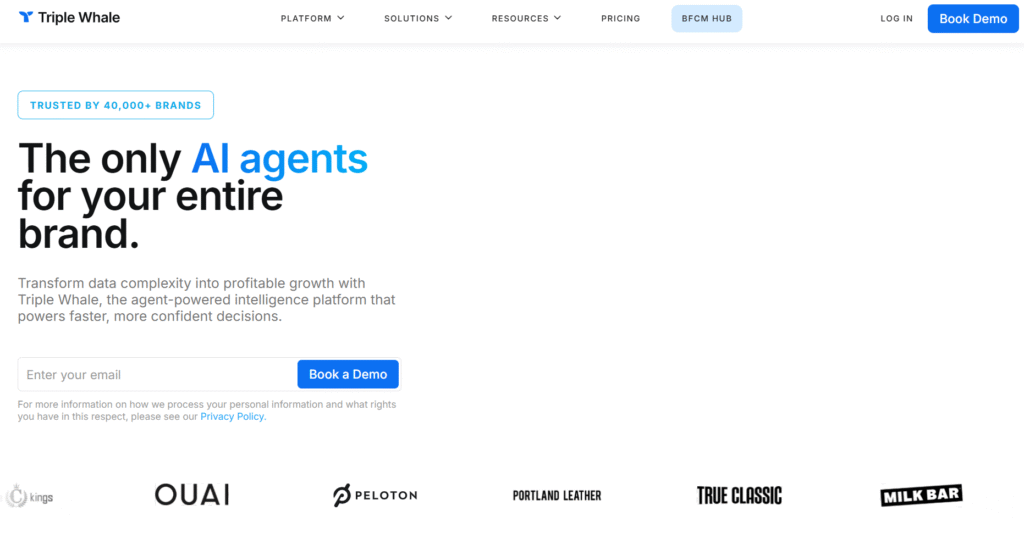
Its highlight feature is a real-time attribution dashboard, which allows e-commerce teams to balance ad expenditure across numerous platforms without drowning in spreadsheets.
Best for: Shopify and direct-to-consumer firms looking to simplify AI attribution for e-commerce.
12. LeadsRx
LeadsRx is one of the most established names in attribution, trusted by enterprises and startups alike.
Its open attribution platform covers online and offline channels, from TV ads to podcasts, digital campaigns, and in-store traffic. AI helps parse huge datasets and refine attribution accuracy across walled gardens like Amazon, Google, and Meta.
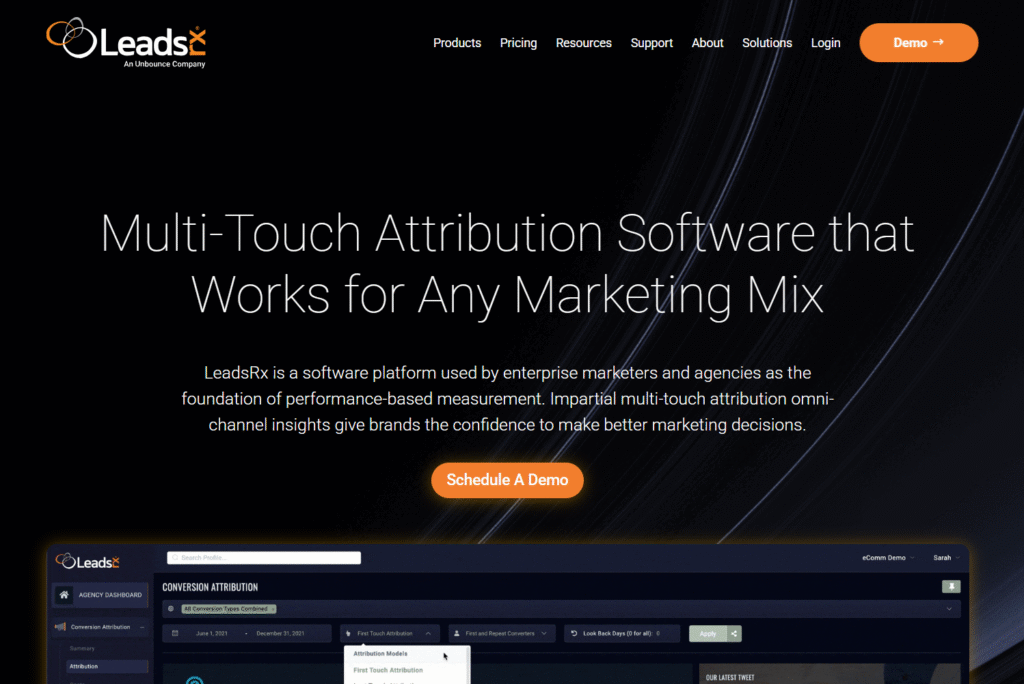
The tool also emphasizes transparency, allowing you to see exactly how AI assigns the attribution models. With privacy-first tracking, it’s often chosen by companies prioritizing trust and compliance.
Best for: Enterprises and businesses using both online and offline advertising.
Conclusion
Choosing the best AI-powered marketing attribution tool in 2025 depends less on features and more on your business model.
- If you DTC on Shopify? Triple Whale.
- Privacy and cookie issues crushing tracking? Corvidae or SegmentStream.
- Want lifetime value clarity? Wicked Reports.
- Running complex data pipelines? Funnel or Windsor.ai.
- High-ticket and phone-heavy sales? Hyros.
- General coverage with no extra tool? GA4.
What all of these tools have in common is clear: attribution is no longer optional. In a world full of fragmented customer journeys, AI gives marketers the missing lens. The best marketers of 2025 aren’t those spending more; they’re the ones understanding where every dollar works hardest. And choosing the right marketing attribution tool is how you turn chaos into clarity.
Related Articles

Comments